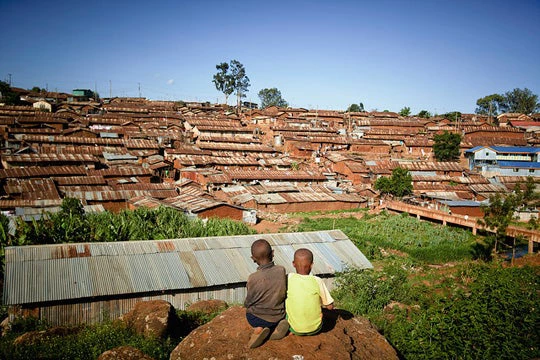
@Gates Foundation
Despite hundreds of millions spent on more and better household surveys across Africa in recent decades, we only have a very rough idea about the levels and trends in income poverty and inequality in sub-Saharan Africa. Many reasons contribute to this unfortunate state of affairs.
First, statistical capacity in African countries remains weak, and funding for surveys depends heavily on donor money. This has reduced the quality of the survey work, the ownership of the survey program, and, more seriously, the consistency and comparability of the surveys. Donors have not helped in this regard. They often come with their own priorities for survey design, their own objectives (which change over the years and reflect changes in questionnaires), and schedules, and sometimes even undermine statistical capacity by diverting scarce national human resources to work on their survey program.
National governments also have far too little interest in building up sustainable statistical capacity and taking ownership of their national survey programs. Moreover, when surveys are inconsistent, there is more room to massage the numbers in the desired direction.
Finally, poverty and inequality statistics are particularly difficult to generate in Africa. For most of the poor, incomes are highly erratic, due to strong seasonality as well as erratic shocks, and therefore hard to capture. Using expenditures as a proxy for incomes might provide more reliable information. But here also accurate measurement on important dimensions of expenditures (such as 'imputed expenditures' on owner-occupied housing, expenditure for food away from home, expenditures on auto-consumption) as well as seasonality make accurate measurement difficult.
There are also serious measurement problems at the top of the income distribution which makes inequality measurement very difficult. The rich often do not participate in surveys. Using tax information to estimate their incomes does not circumvent this problem: Much of their incomes and wealth is held abroad (with the complicity of rich world financial institutions and international tax havens) and thus hard to trace. It’s no surprise therefore that the French economist Thomas Piketty's cross-country database on top incomes only includes recent information from South Africa and Mauritius.
So what is to be done? Many researchers have essentially proposed to abandon household income and/or expenditure surveys and instead rely on proxy indicators. They include using asset indicators drawn from the more comparable and relatively frequent demographic and health surveys, using satellite-generated nighttime light images, or drawing on all sorts of big data such as using mobile phone records, tweets, blogs, etc. Unfortunately, none of these suggestions will do the trick of providing reliable poverty and inequality data.
Asset indicators (such as counting the number of assets or creating an asset index using statistical procedures) suffer from incomparability of asset holding across countries where needs and availability differ greatly. More seriously, they substantially overstate the pace of poverty reduction as there is strong evidence of 'asset drift', i.e. of an accumulation of assets over time, with households accumulating assets such as mobile phones and TVs without getting any less poor. Households often accumulate these assets because they are becoming relatively cheaper, preferences are shifting towards them, and households often do not dispose of them; but this does not mean that these households are any less poor as a result.
Using satellite images of nighttime lights as a proxy for economic activity is also insufficient. It might give a very rough impression of average prosperity, but hit serious limits when assessing poverty and inequality. And reliance on such a measure, of course, would generate perverse incentives Once nighttime lights are a poverty proxy, expect a boost to programs aiming at increasing night lights, regardless of whether this helps the poor or not.
Big data, i.e. information generated from mobile phone records, social networks, or internet traffic, can potentially provide interesting clues about poverty, health problems, or other issues. But they rely on highly selective information that often excludes the poorest. It requires detailed household survey information to correct for these biases and selectivity issues. They can therefore only be useful in situations where of very good representative household surveys are available. But it is precisely this framework that is lacking in many African countries.
If these are all non-solutions, what are potential solutions? There is no way around addressing the fundamental problem: the weak capacity of national statistical offices. Here a mix of national and international resources and associated technical assistance (where useful and required) should ramp up statistical capacity in a reliable and predictable manner over the coming 20 years. Associated with this should be an emphasis on promoting and supporting multi-year survey programs (as done, for example, in the successful MECOVI survey program in Latin America) rather than individual surveys. For that to work all players need to be involved, including the IMF, the World Bank, bilaterals, regional development banks, as well as the large Global Funds, with the country governments being in the driver's seat.
More resources must also come with improved incentives and transparency at national statistical agencies, including more attention given to data cleaning, and early publication of data. It should also include tax information, better tracking of international capital transactions, and assessments of wealth. And it should immediately incorporate multidimensional assessments of poverty at the same time. Here there is huge potential as many indicators of multidimensional poverty can be tracked quite easily once a reliably and comparable survey program is in place.
Much of that work will be difficult, boring, and expensive, with little immediate results. But the long-term benefits are likely to be larger than all the past efforts.
This is the first entry in a new blog series featuring Africa-related research on poverty reduction.


Join the Conversation